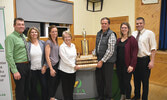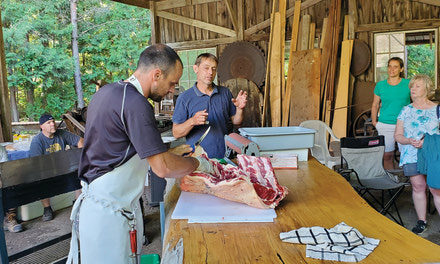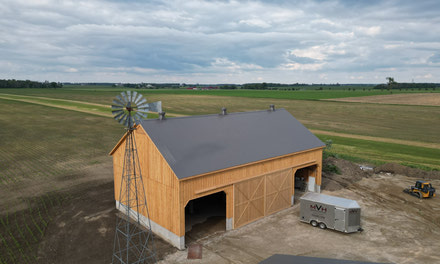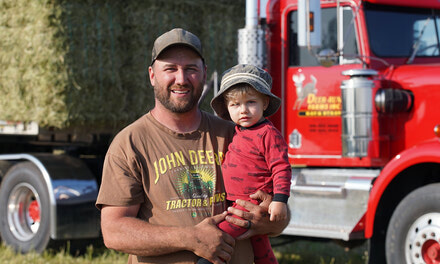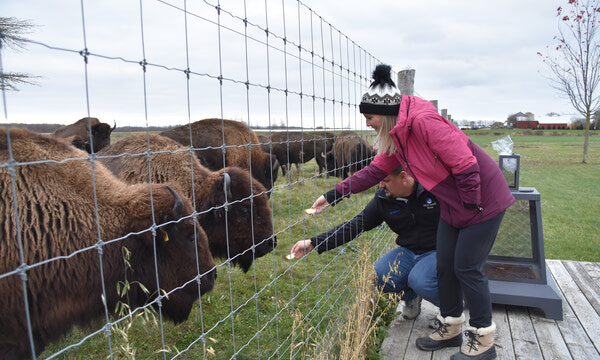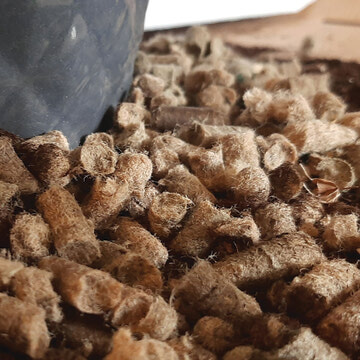By Lisa Boonstoppel-Pot
A farmer known for his commitment to dairy farming, the former Seaforth Farmers Cooperative, Gay Lea and the Canadian Foodgrains Bank has been awarded the Huron County Federation of Agriculture’s Outstanding Contribution to Agriculture award.
The award was presented to Gerry Van den Hengel at the annual meeting of the Huron County Federation of Agriculture held October 27 at the Clinton Legion.
“Thank you for thinking of me because I did not expect this at all,” said Van den Hengel after accepting the trophy which bears the names of many of Huron County’s agricultural leaders over the years.
Van den Hengel shared that he was involved in a lot of organizations after building his farm “from scratch” on Hydro Line Road. He recognized his wife and their 50-year marriage and credited her patience as the farm evolved over the years. “In winter, the drapes of our house did not hang too well. They would stick straight out!”
He also mentioned his commitment to the Knights of Columbus of which he has been a member since 1976.
OFA Update
Zone director Ethan Wallace explained the Ontario Federation of Agricultures (OFA) proposal to restructure the Policy Advisory Committee (PAC) to streamline it and create more training for PAC members.
Under the proposal, a PAC representative will be a director of their county federation versus an elected position from the membership. The new structure will allow the participating member to represent the position views and opinions of the local federation. Currently, PAC representatives do not always align with the views of the local federations, do not always attend local meetings and do not always sit as a director on their local board.
“The focus on the revamped structure is to discuss timely issues and priorities with a focused conversation and expected outcome,” read Wallace from his slides.
Other benefits of the proposed change will include:
– reduce the number of members from 94 to 51
– increase representation from northern and eastern Ontario
– improve accountability for two-way communication on issues
Comments from Ben Lobb
Ben Lobb has watched his Bill C234 to remove the carbon tax from propane and natural gas used by farmers to dry their crops and heat their barns move through the house and into the senate.
“Then the games began,” said Lobb. Many amendments were made including removing the “heating barns” exemption. “At the end of the day it is so frustrating that three senate members – a professor from Vancouver, a journalist from Edmonton and a lawyer from Montreal – none of who are from rural Canada, have the power to make that many alterations.”
Lobb explained he will be able to reject the amendments before voting if he has support to do so. Or, the bill could be dragged into the next election.
“That is my update. I am always learning. But I see it as a real weakness when three people can change the direction of agriculture.”
Cost-Share Funding
Now is the time to upgrade your Environmental Farm Plan (EFP) because cost-share dollars are now available and that is the way to get them, said Lois Sinclair, Regional Program Lead with the Ontario Soil and Crop Improvement Association (OSCIA).
She explained the EFP is a “voluntary, self-assessment for your farm” and that it is always good to “examine ourselves.” She encouraged everyone to have the fourth edition complete to take advantage of cost-share dollars via the Sustainable Canadian Agriculture Partnership which is offering $3.5 billion dollars between 2023-2028.
Sinclair said programs appear and are quickly over. It’s important to check the OSCIA website regularly so sign up for the e-mail list to keep on top of new programs being released.
Battery Energy Storage Systems
Rob Van den Hengel presented a resolution asking the provincial government to develop rules and regulations to govern the planning of battery energy storage system sites.
“I live just outside of Seaforth and the proposed battery energy storage system site is just four miles from where I live,” said Van den Hengel. “The idea is to store power during the night and deplete the batteries when there is increased demand.” He said the proposed site is on prime farmland and there is uncertainty about the technology being used.
The proposal states, in part: “Whereas battery energy storage systems could improve the reliability of green energy. Whereas there are currently no rules and regulations with regards to noise, minimum distance, location of storage sites, especially the use of prime farmland….” Based on this, Huron Fed agreed to send the resolution to the OFA annual meeting for discussion.
Ethan Wallace said OFA has done a lot of research into the systems and is currently preparing a submission to the provincial government on behalf of agriculture.
Groceries and Taxes
Fearing that producers are being blamed for high grocery costs and that in the end, producers will be expected to earn less for their products to reduce those costs, a resolution on groceries and taxes was passed by HCFA members.
The resolution states:
“Whereas groceries and taxes continue to put pressure on Canadian pocketbooks;
Whereas the federal government has asked grocery heads to lower grocery costs
Whereas the greatest impact of this task will be carried by farmers alone;
Therefore, be it resolved that OFA lobby the provincial government and federal government in partnership with the Canadian Federation of Agriculture to be included in conversations with regards to the impact the food chain infrastructure has related to grocery prices.”
One member said there should be a calculation on food labels stating what the farmer actually receives from the product.
Another suggested that a new profit share study be conducted to highlight farmer’s share of food prices. Another commented how the price of fuel and the carbon tax are also playing a role in food prices.
Wallace said the OFA is involved in talks on the grocery store code of conduct and how “oligarchy powers” are pushing farmers and processors on price cuts. Also, there are just some shady practices going on including the value of shelving space. “Some stores make more money selling shelf space than products,” said Wallace.
Paul Klopp interjected that a discussion had already been had on saving farmland. Given cost pressures and grocery store issues, he said, ‘We talk about saving farmland but we need to talk about saving farmers!”
The motion passed. ◊


